|
Posted December 19, 2011..................Below is a chapter from a book titled MYSTERIES AND MIRACLES OF TEXAS, written
by the deceased Jack Kutz and published by Rhombus Publishing Company. I called the publishing company to ask permission
to reproduce this chapter and the the company told me that the author was dead and the widow had no interest and the book
is no longer being published. I therefore acknowledge that I have tried and failed to get permission to reproduce but
no one has yet to tell me no, for lack of interest. ----Note: I have finally discerned there
are no newspaper archives going back to 1873 that would document this event. However, I have learned that California
tracked the number of wagon trains both coming and going in those days, but I could not access all those records, and
those I did access gave no clues to this mystery. If there are ever any clues forthcoming I suspect it will be from
California records.
I will say this, I have read everything I could get my hands on to try to learn what was going on
in this area in the early 1870s, including biographies of Quannah Parker of the Comanches and that history; plus, books on
Geronimo and his tribe. I have read several books on the buffalo hunters that parallelled the Indian's lives in those
years and I have concluded that it is quite probable that either Indians or a rogue Mexican gang led by "Hurricane Jack" could
have been the demise of the wagon train. Colonel McKenzie, the nemisis of the Comanches took a year off in 1873 due
to a trip to Mexico and then for his health, leaving west Texas unguarded. Plus, Indians who left the reservation
in Ft. Sill in those days and went on the warpath and afterwards returned to the reservation and told what they did were simply shot!
This explains the silence on this event. The sandhills were the last stronghold of the Comanches after their hideout
called Adobe Walls in the panhandle in north Texas. The Sandhills area in those years was not populated due to
the scarcity of water and game, and I suspect this wagon train was headed to Fort Worth then beyond and got caught by someone
who knew they had to be totally silent on what they had done to it, or else they would be shot by the blue suited military
men who were appointed to bring them under control. That is a matter of record, supported by our military and both the
Comanche and Apache's testimony. That is my bet on what happened. May 2012..........MLM
When I was a small tyke living in Notrees and first heard about the 1901 discovery of a 40 unit wagon train found in
the Monahans sandhills, I was amazed. I have heard over the years various second hand recollections from people from
Odessa who also heard of the event, but over the years I have never seen a written story or book or article on the wagon train
until I found this book published and released in 1994. I thought nothing much about it until I became aware of a historical
marker in Odessa about a character named William C. Sublett, a man who lived in Odessa in the late 1800s and who alledgedly
spent gold nuggets there to buy rounds of drinks for the house and bragged that he found nuggets in the Guadalupe Mountains
in far west Texas. J. Frank Dobie, a revered Texas writer and semi-historian, even wrote a piece about William C. Sublett
and made as many people as possible believe their might be a gold mine in them thar hills. Baloney. There never
was and never will be. The only gold found around Odessa is black and liquid, and it is called oil, so Sublett was lying
to a naive bunch of people and for a reason. I think he found the wagon train and scoured through it and found some
nuggets among the massacred remains of that wagon train, and why no one has ever put two and two together on these two subjects
is beyond me.
I have found newspaper articles from the Monahans Newspaper written in 1937 that were authored by the daughter of the
man who found the wagon train in 1901, Judge Arther Hayes. Judge Hayes was quoted as saying the finding of the train
changed his life. He spent a good part of his time searching through the partially covered ruins in a remote part of
the sand hills and those remains were on what is now known as the Vest Ranch in Monahans. (I think) I am in the
process of trying to validate the article Judge Hays found in a Yuma Arizona newspaper that has been in existence since the
1850s. Judge Hays tells people he found that article after getting obsessed with trying to learn as much about it as
he could. I will post what I find on this event as I learn to format the copied newspaper articles into text that will
be compatible with the host of this website. If you have any firsthand knowledge of the site on the Vest Ranch, I would
love to hear from you. I have sent emails to nearby ranchers and have heard from parts of the family, but not the one
I really want to contact, just yet. MLM
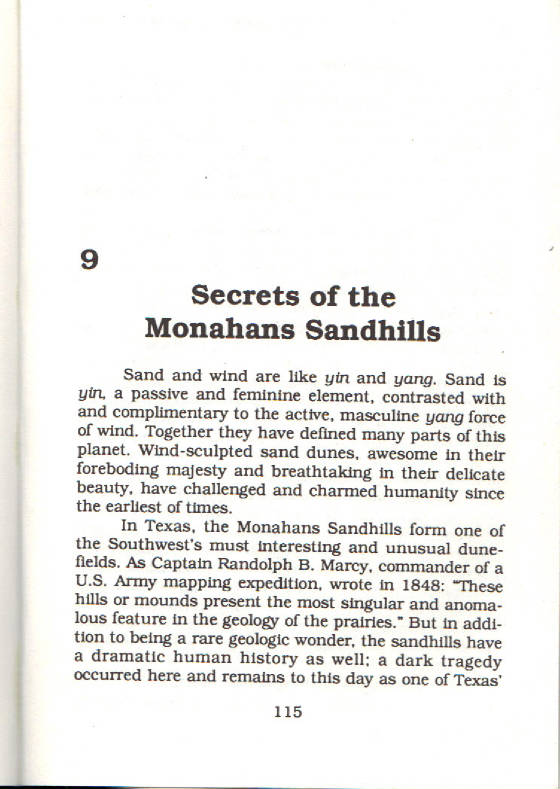
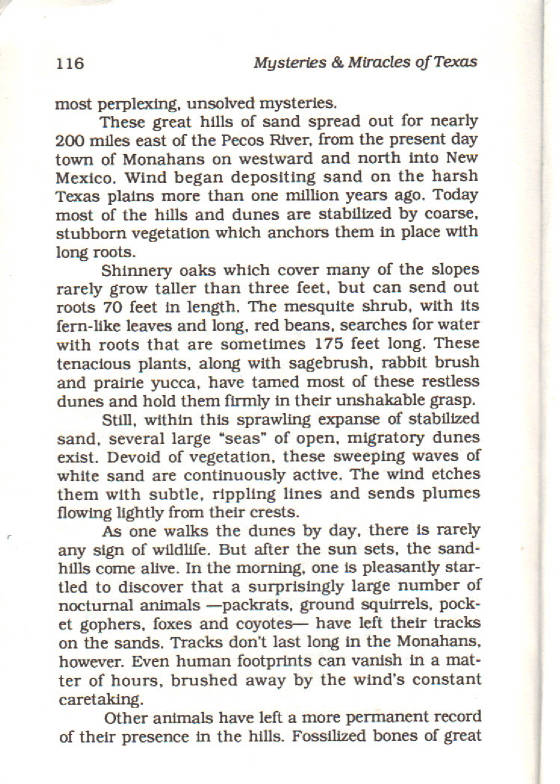
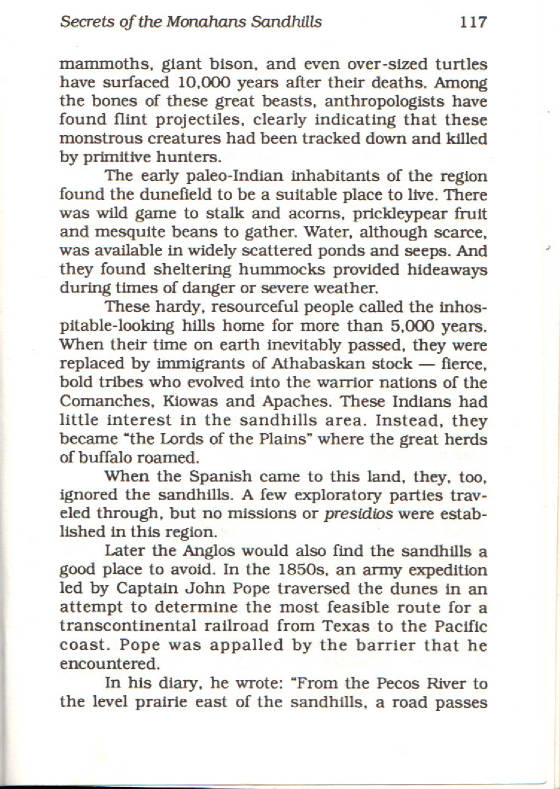
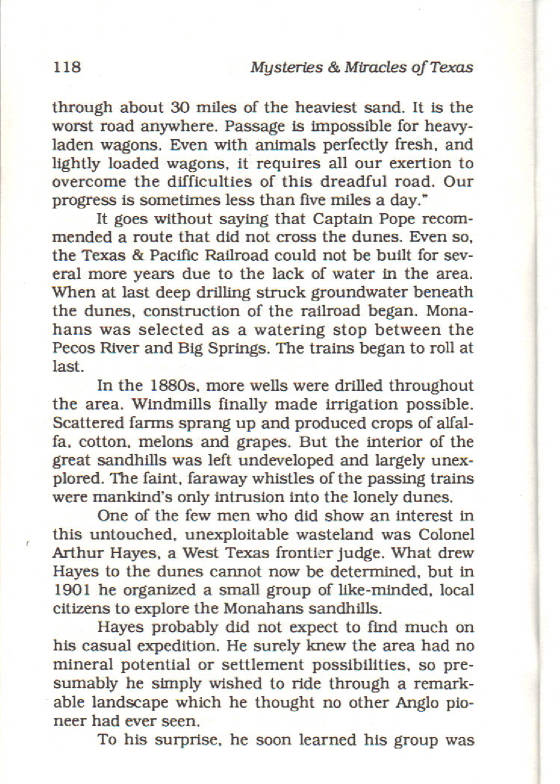
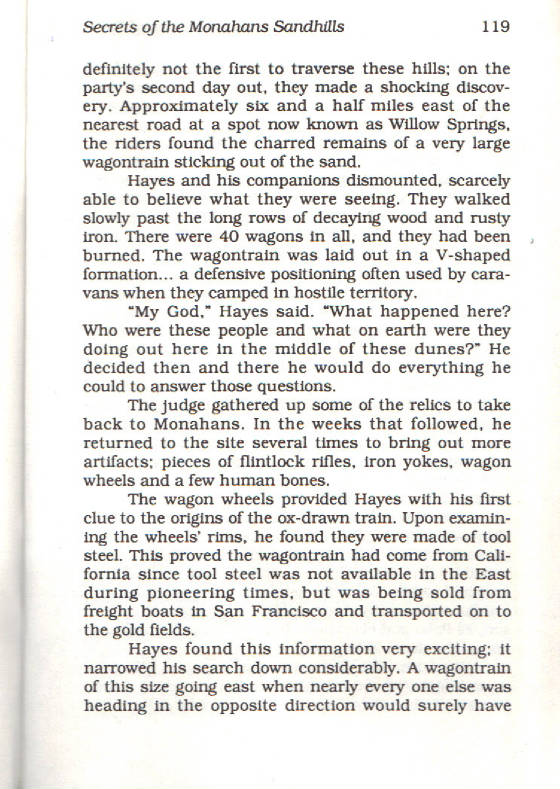
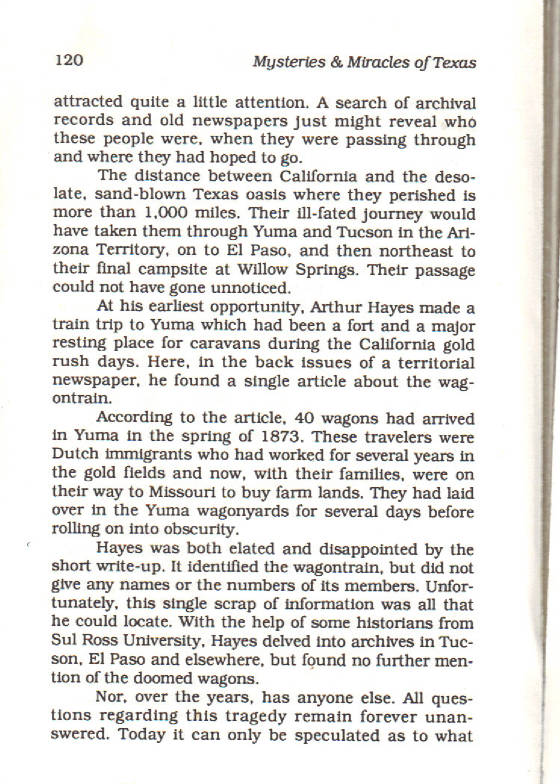
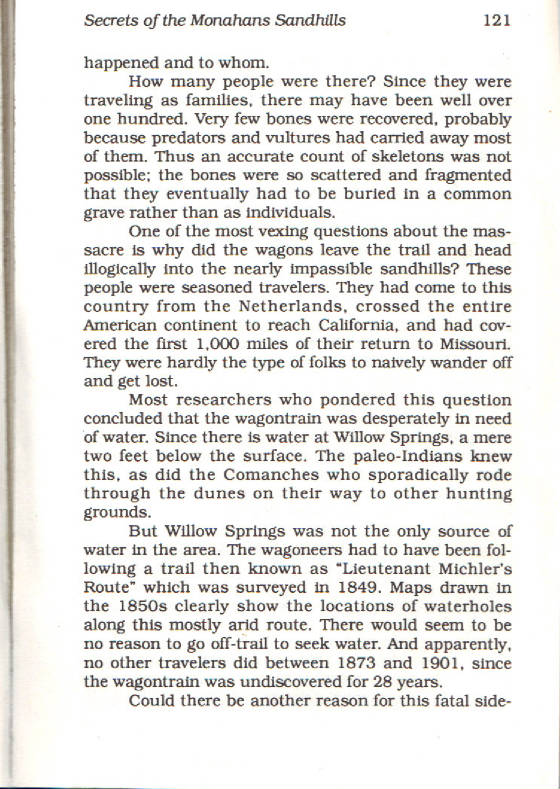
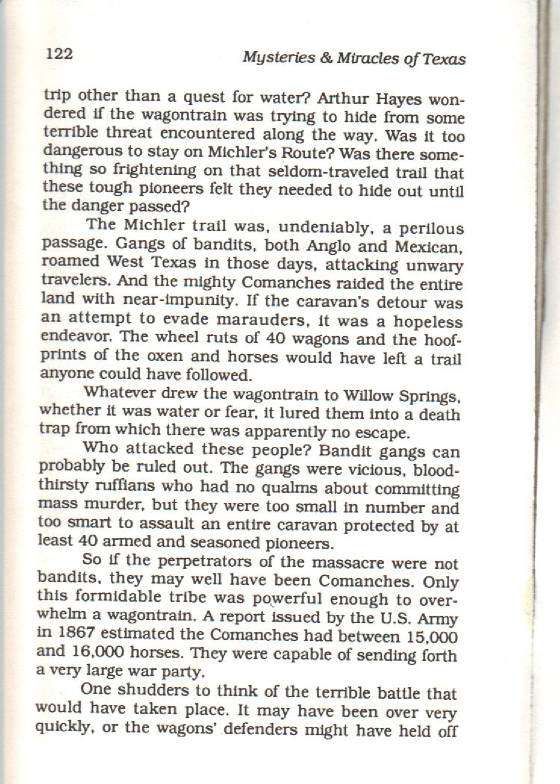
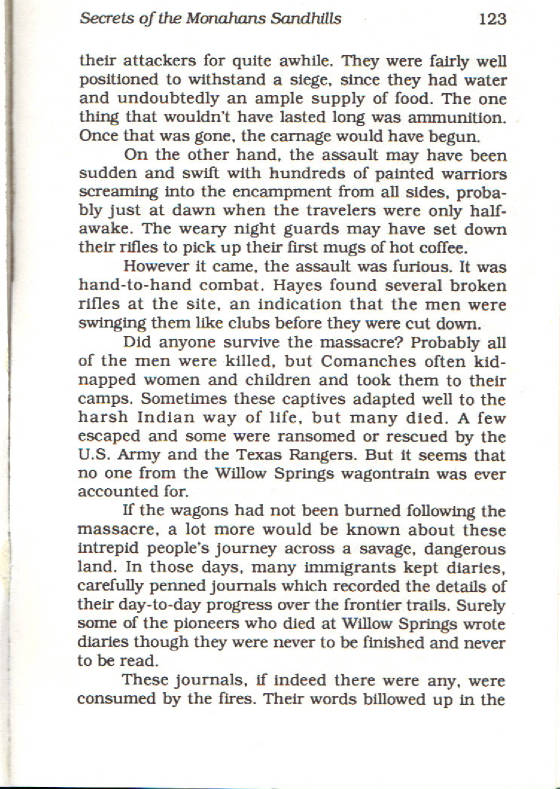
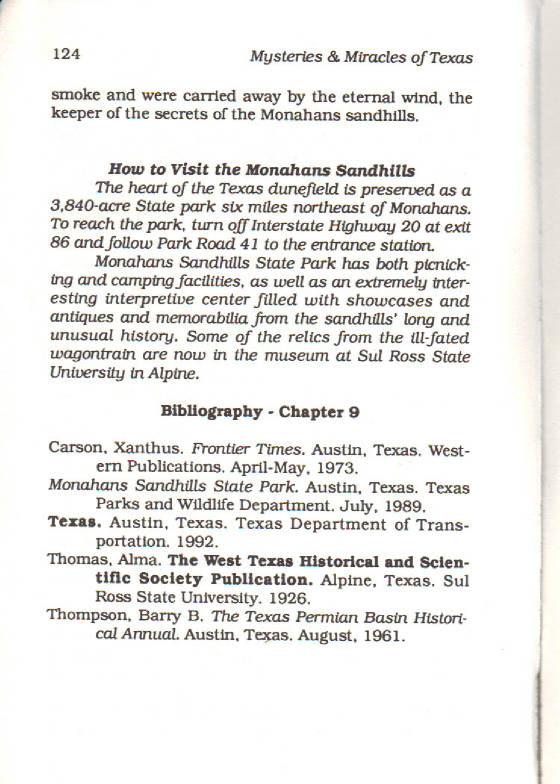
Below is an article from the archives of the Monahans newspaper sent to me by email by historians in that city in 2011.
It is written by Judge Arther Hayes and his wife in 1937. There are minor discrepencies with respect to facts outlined
in the story put together in the book about Texas Mysteries. However, it is an article by the man who found the remains
first, except for the theory that William C. Sublett might have been the first to find the remains!
There is a considerable amount of hogwash on the web about this wagon train. In fact, I found an article in the
Lubbock newspaper written in 1933 that was laughable in his treatment of the story. Another article on the website has
the wagontrain being found in the '30s and originating in Fort Worth! Of course it was carrying tons of gold.
I don't know what that author was smoking.
We will probably never know the real truth about this event, and I think the best that can be done at this point is to
try to validate the article Judge Hayes found in Yuma. I intend to try to do just that. Another approach, and
this one is a hard stretch, is to try to stir up enough interest in this so as to stimulate research in the San Francisco
area. Surely, in a city that size in 1873 a story was written by a newspaper reporter about a wagon train that size
leaving California to go eastward and taking the southern route through Indian territories. But what if that wagon
train organizer did not want the attention because they were carrying their life savings with them and did not want that fact widely
known?. But, I thought that is why they traveled in large groups anyway, and carried their own guns with them.
This is truly a mystery. Therefore, my interests are to validate the article in Yuma because I had two conversations
with notebable historians in west Texas who doubt there ever was a wagon train, but I don't think either one of them ever
scoured the archives at Monahans to uncover the information about Arther Hayes as I have done. Neither of them offered
any reason to doubt the wagon train, but they nevertheless do so.
You can research the life of William C.Sublett all day long on the web; it is well documented because of his claims
to know where a lost gold mine was in the Guadalupe mountains in west Texas, west of the Pecos River. I think his claims
were all false to mislead the people in his area to keep them out of the sandhills in Monahans to give him the time to throughly
go through the ruins to find the pouches of gold that the Indians had no interest in because they believed gold brought the
white man into their lands, and that is exactly what they did not want to happen. So I will not fill this space
with Sublett's life's details at this time except to put in an article out of a history book written about Odessa when
I can get permission to reproduce it. MLM
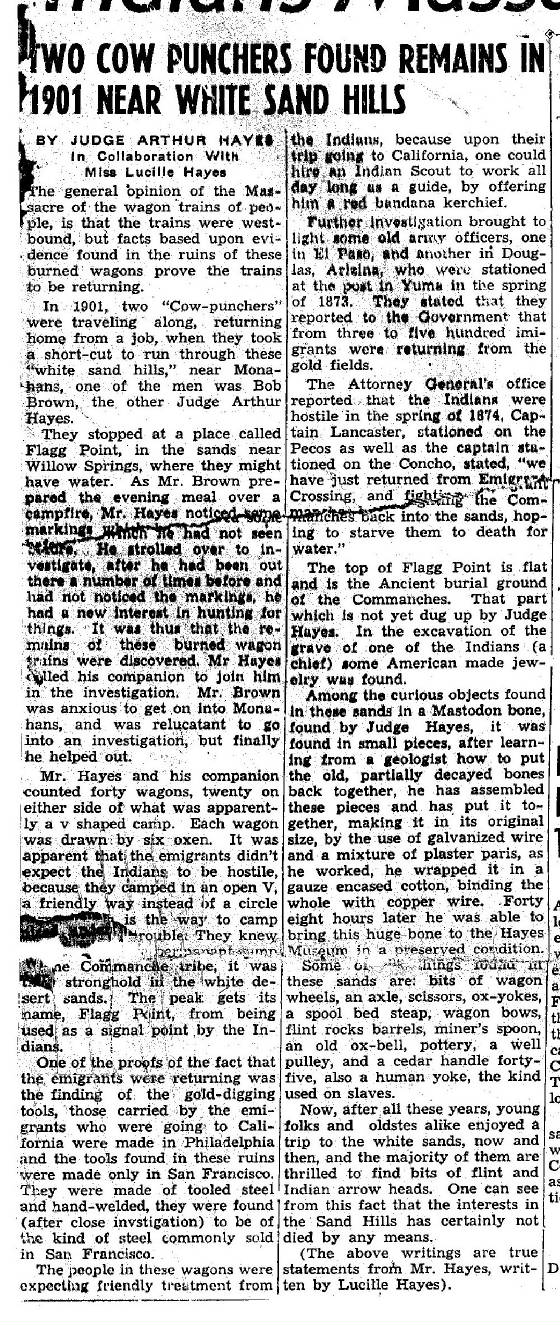
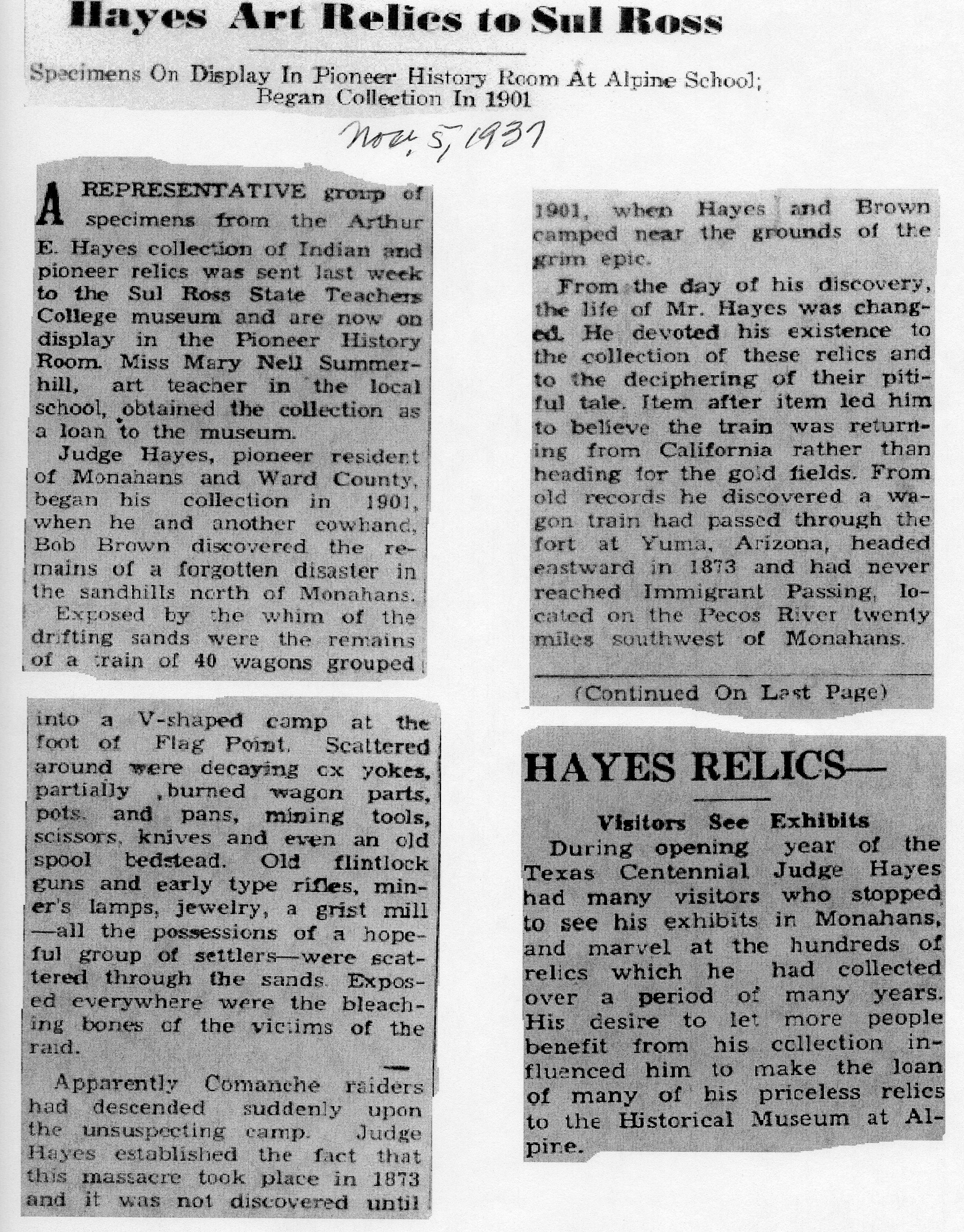
Hayes was a prominent and honored citizen in Monahans during the oil boom days just prior to World War Two, according
to some of the many articles written about him in the local newspaper. To me, this makes him a valid source because
my deceased parents lived in that area while he was still alive and they could have known him. I remember that they
certainly believed in what they read about in those days, but as time goes on, Mr. Hayes and his legendary tales pales into
obscurity for lack of any written information beyond him. To me, that fact is just indicitive of the times. Communication
was mostly local in those days. There was no TV or radio or websites in the late 1880s. I guess what keeps me
interested in the subject is that so many local historians discount the validity of the wagontrain incident in spite of the
obvious integrity of the wagon train's most vociferous personality, the discoverer of it, Arthur Hayes. I must be missing
something. I have talked to several writers who downplay this event saying there is nothing to research, and they
imply that it probably did not happen. I have thought that myself, but to think that it ddid not happen is to also imply
that Judge Hayes was a hoax and had an ulterior motive for planting his stories in the local newspaper and colleges.
But I cannot imagine what his motive would be unless it was to attract people to the area to sell them land. But if
you are in the land selling business in the early 1900s, why would you choose to sell real estate in an area that has no water
or crop lands? It takes 10 acres of grass in that area to support one cow, and that rule could be questionable in drought
years, which is nearly all the time in the desert! That does not make a lot of sense.
One might argue that the railroad coming through in 1881 would foster prosperity, but how could a railroad support more
than just a few people in an area like that, no water and no top soil for miles. It is a well know fact that there was
no growth to mention until oil kick-started the area in the mid to late '20s, so Judge Hayes would have been more than twenty
years too early. So why would a reputable law man dedicate his life to spreading a myth, and why would colleges like
Sul Ross and Texas Tech buy into these myths and recognize his contributions to history in that area? It does not add
up, in my opinion, just to invalidate Judge Hayes due to a lack of written evidence outside the Monahans area....................Enough
of that for now, but more later. But scroll down and click on the link below and enjoy appropriate music for the subject
above. MLM
|

